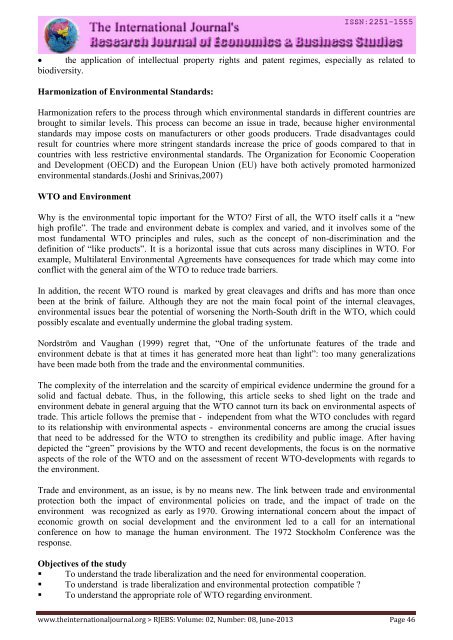Research Journal of Economics & Business Studies - RJEBS - The ...
Research Journal of Economics & Business Studies - RJEBS - The ...
Research Journal of Economics & Business Studies - RJEBS - The ...
- No tags were found...
Create successful ePaper yourself
Turn your PDF publications into a flip-book with our unique Google optimized e-Paper software.
the application <strong>of</strong> intellectual property rights and patent regimes, especially as related to<br />
biodiversity.<br />
Harmonization <strong>of</strong> Environmental Standards:<br />
Harmonization refers to the process through which environmental standards in different countries are<br />
brought to similar levels. This process can become an issue in trade, because higher environmental<br />
standards may impose costs on manufacturers or other goods producers. Trade disadvantages could<br />
result for countries where more stringent standards increase the price <strong>of</strong> goods compared to that in<br />
countries with less restrictive environmental standards. <strong>The</strong> Organization for Economic Cooperation<br />
and Development (OECD) and the European Union (EU) have both actively promoted harmonized<br />
environmental standards.(Joshi and Srinivas,2007)<br />
WTO and Environment<br />
Why is the environmental topic important for the WTO? First <strong>of</strong> all, the WTO itself calls it a “new<br />
high pr<strong>of</strong>ile”. <strong>The</strong> trade and environment debate is complex and varied, and it involves some <strong>of</strong> the<br />
most fundamental WTO principles and rules, such as the concept <strong>of</strong> non-discrimination and the<br />
definition <strong>of</strong> “like products”. It is a horizontal issue that cuts across many disciplines in WTO. For<br />
example, Multilateral Environmental Agreements have consequences for trade which may come into<br />
conflict with the general aim <strong>of</strong> the WTO to reduce trade barriers.<br />
In addition, the recent WTO round is marked by great cleavages and drifts and has more than once<br />
been at the brink <strong>of</strong> failure. Although they are not the main focal point <strong>of</strong> the internal cleavages,<br />
environmental issues bear the potential <strong>of</strong> worsening the North-South drift in the WTO, which could<br />
possibly escalate and eventually undermine the global trading system.<br />
Nordström and Vaughan (1999) regret that, “One <strong>of</strong> the unfortunate features <strong>of</strong> the trade and<br />
environment debate is that at times it has generated more heat than light”: too many generalizations<br />
have been made both from the trade and the environmental communities.<br />
<strong>The</strong> complexity <strong>of</strong> the interrelation and the scarcity <strong>of</strong> empirical evidence undermine the ground for a<br />
solid and factual debate. Thus, in the following, this article seeks to shed light on the trade and<br />
environment debate in general arguing that the WTO cannot turn its back on environmental aspects <strong>of</strong><br />
trade. This article follows the premise that - independent from what the WTO concludes with regard<br />
to its relationship with environmental aspects - environmental concerns are among the crucial issues<br />
that need to be addressed for the WTO to strengthen its credibility and public image. After having<br />
depicted the “green” provisions by the WTO and recent developments, the focus is on the normative<br />
aspects <strong>of</strong> the role <strong>of</strong> the WTO and on the assessment <strong>of</strong> recent WTO-developments with regards to<br />
the environment.<br />
Trade and environment, as an issue, is by no means new. <strong>The</strong> link between trade and environmental<br />
protection both the impact <strong>of</strong> environmental policies on trade, and the impact <strong>of</strong> trade on the<br />
environment was recognized as early as 1970. Growing international concern about the impact <strong>of</strong><br />
economic growth on social development and the environment led to a call for an international<br />
conference on how to manage the human environment. <strong>The</strong> 1972 Stockholm Conference was the<br />
response.<br />
Objectives <strong>of</strong> the study<br />
• To understand the trade liberalization and the need for environmental cooperation.<br />
• To understand is trade liberalization and environmental protection compatible ?<br />
• To understand the appropriate role <strong>of</strong> WTO regarding environment.<br />
www.theinternationaljournal.org > <strong>RJEBS</strong>: Volume: 02, Number: 08, June-2013 Page 46

















